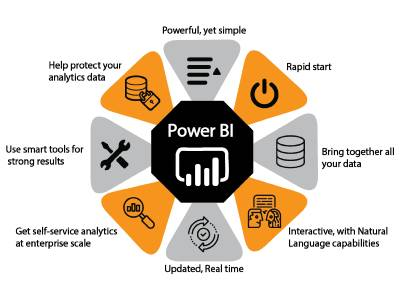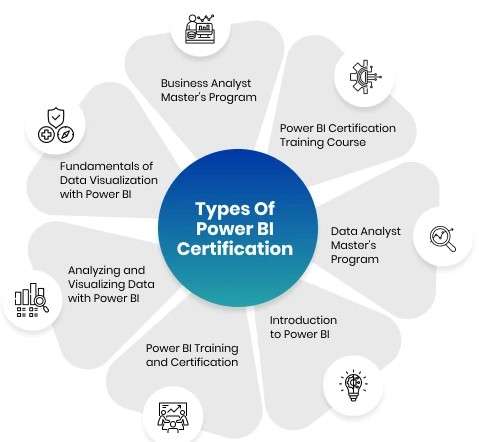
- Introduction
- What Does a Power BI Developer Do?
- Skills Required to Become a Power BI Developer
- Educational Background and Certifications
- Step-by-Step Guide to Becoming a Power BI Developer
- Best Practices for Power BI Developers
- Job Opportunities and Career Growth
- Conclusion
Introduction
Becoming a Power BI Developer is an exciting career path for those interested in data analysis, business intelligence, and transforming raw data into actionable insights. As organizations increasingly rely on data-driven decisions, the demand for skilled Power BI professionals continues to grow. A Power BI Developer plays a critical role in connecting to data sources, modeling and visualizing data, and creating interactive reports and dashboards that help stakeholders make informed choices. To embark on this journey, one must develop a solid understanding of data analytics fundamentals, proficiency in Power BI tools, and knowledge of data modeling concepts such as DAX (Data Analysis Expressions) and Power Query. Business Analyst Training programs often cover these essential skills, providing a comprehensive foundation for aspiring analysts.Familiarity with SQL, Excel, and cloud services like Azure can also enhance your capabilities. Whether you’re starting from scratch or transitioning from another data-related role, becoming a Power BI Developer involves continuous learning, hands-on practice, and a keen eye for detail and storytelling through data. This introduction aims to provide a roadmap for aspiring developers, outlining the essential skills, tools, and steps needed to build a successful career in Power BI development, while highlighting the real-world impact of this role across industries.
Do You Want to Learn More About Business Analyst? Get Info From Our Business Analyst Training Today!
What Does a Power BI Developer Do?
- Data Modeling and Transformation: They structure and prepare data using tools like Power Query and DAX, ensuring it’s clean, organized, and ready for analysis.
- Report and Dashboard Development: Developers create interactive and visually appealing dashboards and reports that clearly communicate insights and trends, often while exploring Tableau Data Science techniques to enhance data interpretation and storytelling.
- Data Source Integration: They connect Power BI to various data sources, such as Excel files, SQL databases, cloud platforms (e.g., Azure), and APIs.
A Power BI Developer plays a vital role in turning raw data into meaningful insights that support business decisions. They use Microsoft’s Power BI suite to design, build, and maintain business intelligence solutions, making data accessible and understandable for non-technical users. Their work bridges the gap between data and decision-making. Below are the core responsibilities of a Power BI Developer:

- Performance Optimization: Developers optimize queries, data models, and reports for better speed and responsiveness, especially with large datasets.
- Collaboration with Stakeholders: They gather requirements, understand business goals, and tailor reports to meet the specific needs of different departments or users.
- Maintenance and Security: Power BI Developers ensure reports are kept up to date, manage data refresh schedules, and implement security measures like row-level access control.
Skills Required to Become a Power BI Developer
To become a successful Power BI Developer, a blend of technical, analytical, and business-related skills is essential. Proficiency in Power BI itself is a must, including a strong grasp of data modeling, Power Query for data transformation, and DAX (Data Analysis Expressions) for creating complex calculations and measures. A solid understanding of SQL is also important for querying databases and managing data sources effectively. Familiarity with Microsoft Excel and its functions can enhance data handling capabilities, especially for those transitioning from traditional reporting tools.Knowledge of data warehousing concepts, ETL (Extract, Transform, Load) processes, and relational databases helps in structuring and integrating data efficiently, especially when applying insights from resources like the Tableau Calculated Field guide. Additionally, experience with cloud platforms like Microsoft Azure and services such as Azure Synapse or Data Lake can give developers an edge in modern, scalable data environments. Strong analytical thinking and attention to detail are crucial for identifying trends and ensuring data accuracy. Equally important are soft skills like problem-solving, communication, and the ability to understand business requirements, as developers often work closely with stakeholders. Continuous learning and staying updated with Power BI updates and new features also play a key role in maintaining effectiveness and growing in this dynamic field.
Would You Like to Know More About Business Analyst? Sign Up For Our Business Analyst Training Now!
Educational Background and Certifications
- Bachelor’s Degree in a Related Field: Degrees in Computer Science, Information Technology, Data Science, Business Analytics, or related disciplines provide a solid starting point.
- Master’s Degree (Optional but Beneficial): A master’s in Data Analytics, Business Intelligence, or similar fields can offer advanced knowledge and open doors to senior roles, especially when paired with a strong understanding of tools covered in What Is Power BI guides and resources.
- Microsoft Certified: Power BI Data Analyst Associate: This is the most recognized certification for Power BI professionals, validating your ability to prepare, model, visualize, and analyze data.
While there’s no single path to becoming a Power BI Developer, a strong educational foundation combined with relevant certifications can significantly boost your credibility and job prospects. Most Power BI roles prefer candidates with a background in data, technology, or business, along with proof of practical skills through certifications. Here are the key educational paths and certifications that support a career in Power BI development:

- Microsoft Certified: Azure Data Fundamentals: Helpful for understanding cloud data services and how Power BI integrates with Microsoft’s Azure ecosystem.
- Certifications in SQL and Excel: Certifications that demonstrate proficiency in SQL and Excel can enhance your data handling and reporting capabilities.
- Online Courses and Specializations: Platforms like Coursera, Udemy, and LinkedIn Learning offer practical, project-based courses that help you build real-world Power BI skills.
- Plan Before You Build: Understand the business requirements, define key metrics, and plan the data model and report structure before starting development.
- Use a Star Schema for Data Modeling: Design your data model using a star schema with clear fact and dimension tables to optimize performance and ensure accurate relationships.
- Optimize DAX Calculations: Write efficient DAX formulas, avoid complex logic in visuals, and reuse measures where possible to improve report responsiveness principles that are just as important when working with enterprise platforms covered in What is Tableau Server guides.
- Limit the Use of Visuals: Keep dashboards clean and focused by using only necessary visuals, avoiding clutter, and ensuring each chart adds value to the report.
- Implement Row-Level Security (RLS): Protect sensitive data by setting up RLS to control user access based on roles and permissions.
- Document Your Work: Use clear naming conventions, add descriptions to fields and measures, and maintain documentation to make your reports understandable and easy to maintain.
Step-by-Step Guide to Becoming a Power BI Developer
Becoming a Power BI Developer involves a structured approach that combines education, skill development, and practical experience. Start by building a strong foundation in data analysis through a relevant degree in Computer Science, Information Technology, or Business Analytics. Next, develop proficiency in Microsoft Excel and SQL, as these are essential tools for data manipulation and querying. Once you have the basics, begin learning Power BI by exploring its key components like Power Query, DAX (Data Analysis Expressions), and data modeling techniques, all of which are integral parts of Business Analyst Training. Practice by working on sample datasets and building interactive dashboards to understand real-world applications. Strengthen your knowledge further by taking online courses or tutorials, and pursue certifications such as the Microsoft Certified: Power BI Data Analyst Associate to validate your skills. Gain hands-on experience by contributing to personal projects, freelancing, or internships that involve reporting and data visualization tasks. It’s also important to stay updated with new Power BI features and industry trends by following Microsoft updates, blogs, and community forums. Finally, polish your soft skills such as problem-solving, communication, and business acumen to effectively translate data into actionable insights. By following these steps consistently, you can confidently launch and grow your career as a Power BI Developer.
Looking to Master Business Intelligence? Discover the Business Intelligence Master Program Training Course Available at ACTE Now!
Best Practices for Power BI Developers
To build efficient, scalable, and user-friendly reports, Power BI Developers should follow a set of best practices that ensure quality, performance, and clarity in their work. Adhering to these guidelines not only improves the end-user experience but also simplifies maintenance and future enhancements. Below are six essential best practices every Power BI Developer should follow:
Job Opportunities and Career Growth
The demand for Power BI Developers is steadily increasing as organizations across industries seek data-driven solutions to enhance decision-making and performance. Power BI Developers are in high demand in sectors such as finance, healthcare, retail, manufacturing, and technology, where data visualization and business intelligence are critical. Entry-level professionals often begin as Data Analysts or Junior BI Developers, gradually progressing to more advanced roles like Senior Power BI Developer, Business Intelligence Analyst, or BI Consultant. With experience and continued learning, professionals can further advance into leadership positions such as BI Manager, Data Architect, or Analytics Lead, especially by applying best practices from resources like Tableau Reporting tips to enhance their reporting expertise. The career path is dynamic, offering opportunities to specialize in areas like data engineering, AI integration, or cloud-based analytics, especially with tools like Azure and Microsoft Fabric. Freelancing and remote work are also viable options, given the global adoption of Power BI. Additionally, certifications and continuous skill upgrades can significantly boost job prospects and salary potential. As data continues to play a central role in strategic planning, the career outlook for Power BI professionals remains strong, making it a rewarding field for those who enjoy working at the intersection of data, technology, and business.
Want to Learn About Business Analyst? Explore Our Business Analyst Interview Questions and Answers Featuring the Most Frequently Asked Questions in Job Interviews.
Conclusion
Becoming a Power BI Developer is a promising and rewarding career path for individuals passionate about data, analytics, and business intelligence. With the right blend of educational background, technical skills, and certifications, aspiring professionals can effectively enter and grow within this field. Power BI Developers play a crucial role in transforming raw data into meaningful insights through interactive dashboards and reports that support informed business decisions. By following a structured learning path starting with foundational tools like Excel and SQL, mastering Power BI features such as DAX and Power Query, and gaining practical experience through Business Analyst Training you can build a strong profile in this high-demand domain. Adopting best practices in data modeling, security, and report design ensures your work remains efficient and impactful. With opportunities across various industries and clear paths for advancement into senior and specialized roles, the field offers long-term career growth and flexibility, including remote work and consulting options. As organizations continue to prioritize data-driven strategies, the role of Power BI Developers will only become more critical, making now an excellent time to begin your journey in this dynamic and evolving profession.


